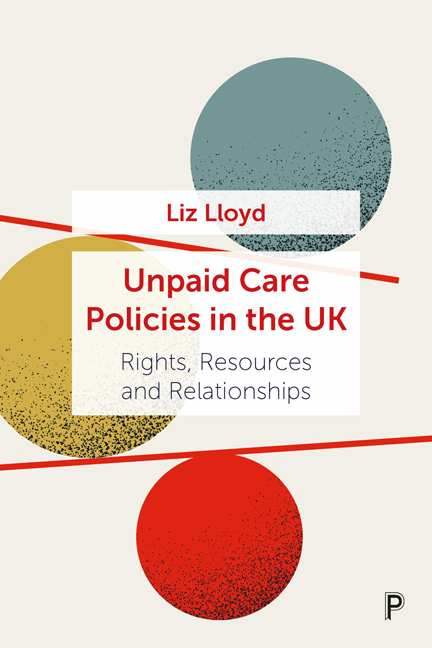Book contents
- Frontmatter
- Contents
- About the author
- Preface
- 1 Introduction and background to unpaid care in the UK
- 2 Research and knowledge development on unpaid care in the UK
- 3 Policies to support unpaid carers
- 4 Policies into practice
- 5 Analysis of policies in context
- 6 The political and ethical dimensions of care
- 7 Conclusions
- References
- Index
2 - Research and knowledge development on unpaid care in the UK
Published online by Cambridge University Press: 20 January 2024
- Frontmatter
- Contents
- About the author
- Preface
- 1 Introduction and background to unpaid care in the UK
- 2 Research and knowledge development on unpaid care in the UK
- 3 Policies to support unpaid carers
- 4 Policies into practice
- 5 Analysis of policies in context
- 6 The political and ethical dimensions of care
- 7 Conclusions
- References
- Index
Summary
Introduction
This chapter examines the ways in which knowledge about unpaid care has developed over the past three decades. An intriguing question is whether patterns of unpaid care have changed or more information is now available, which sheds new light on long-standing patterns. In addressing this question, further questions arise, including how has knowledge on unpaid care developed over recent decades and to what end? Such questions matter, not only because knowledge is essential to the development of appropriate support for unpaid care but also because these questions draw attention to the complexities of care and to the way that care is characterised in the policy process. For example, Parker (1990) reflected on the popular illusion that in modern societies the family no longer cares about its members with support needs. Despite copious research evidence to the contrary, this misconception remains influential. For example, in 2013, Jeremy Hunt MP (the then Secretary of State for Health) argued that there was a need to ‘reinvigorate the social contract between generations’ so that older people in Britain could enjoy similar levels of ‘reverence and respect’ as their counterparts in Asia (Butler 2013). In 2017, David Mowat MP urged people to accept their duty to look after their elderly parents, not least because of the ‘volume of numbers that we see coming down the track’ (Asthana 2017). Words such as reverence, respect and duty are heavily freighted with moral overtones, although, arguably, moral standards apply irrespective of the numbers of people involved. David Mowat's statement gives the political context: unpaid care for family members is a hot topic for policy makers because of the numbers of people involved.
In 2021, a Family Resources Survey for the Department for Work and Pensions (DWP) estimated that between 2019 and 2020 around 4.5 million people in the UK (around 7 per cent of the population) were providing ‘informal’ care: that is, where caring is not a paid job (DWP 2021). The survey findings are at odds with those of Carers UK, which estimated that prior to the COVID-19 pandemic there were ‘up to 9.1 million carers in the UK’ and that this number had increased dramatically by 4.5 million during the course of the pandemic (Carers UK 2020).
- Type
- Chapter
- Information
- Unpaid Care Policies in the UKRights, Resources and Relationships, pp. 15 - 35Publisher: Bristol University PressPrint publication year: 2023



